1931 (MCMXXXI) was a common year starting on Thursday of the Gregorian calendar, the 1931st year of the Common Era (CE) and Anno Domini (AD) designations, the 931st year of the 2nd millennium, the 31st year of the 20th century, and the 2nd year of the 1930s decade.

1866 (MDCCCLXVI) was a common year starting on Monday of the Gregorian calendar and a common year starting on Saturday of the Julian calendar, the 1866th year of the Common Era (CE) and Anno Domini (AD) designations, the 866th year of the 2nd millennium, the 66th year of the 19th century, and the 7th year of the 1860s decade. As of the start of 1866, the Gregorian calendar was 12 days ahead of the Julian calendar, which remained in localized use until 1923.
1916 (MCMXVI) was a leap year starting on Saturday of the Gregorian calendar and a leap year starting on Friday of the Julian calendar, the 1916th year of the Common Era (CE) and Anno Domini (AD) designations, the 916th year of the 2nd millennium, the 16th year of the 20th century, and the 7th year of the 1910s decade. As of the start of 1916, the Gregorian calendar was 13 days ahead of the Julian calendar, which remained in localized use until 1923.

The 1770s was a decade of the Gregorian calendar that began on January 1, 1770, and ended on December 31, 1779. A period full of discoveries, breakthroughs happened in all walks of life, as what emerged at this period brought life to most innovations we know today.
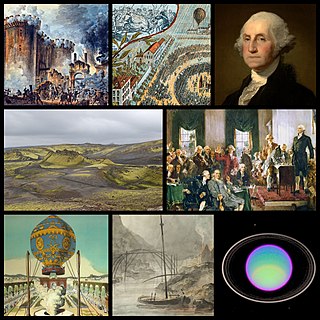
The 1780s was a decade of the Gregorian calendar that began on January 1, 1780, and ended on December 31, 1789. A period widely considered as transitional between the Age of Enlightenment and the Industrial Revolution, the 1780s saw the inception of modern philosophy. With the rise of astronomical, technological, and political discoveries and innovations such as Uranus, cast iron on structures, republicanism and hot-air balloons, the 1780s kick-started a rapid global industrialization movement, leaving behind the world's predominantly agrarian customs in the past.

1782 (MDCCLXXXII) was a common year starting on Tuesday of the Gregorian calendar and a common year starting on Saturday of the Julian calendar, the 1782nd year of the Common Era (CE) and Anno Domini (AD) designations, the 782nd year of the 2nd millennium, the 82nd year of the 18th century, and the 3rd year of the 1780s decade. As of the start of 1782, the Gregorian calendar was 11 days ahead of the Julian calendar, which remained in localized use until 1923.

1797 (MDCCXCVII) was a common year starting on Sunday of the Gregorian calendar and a common year starting on Thursday of the Julian calendar, the 1797th year of the Common Era (CE) and Anno Domini (AD) designations, the 797th year of the 2nd millennium, the 97th year of the 18th century, and the 8th year of the 1790s decade. As of the start of 1797, the Gregorian calendar was 11 days ahead of the Julian calendar, which remained in localized use until 1923.

1796 (MDCCXCVI) was a leap year starting on Friday of the Gregorian calendar and a leap year starting on Tuesday of the Julian calendar, the 1796th year of the Common Era (CE) and Anno Domini (AD) designations, the 796th year of the 2nd millennium, the 96th year of the 18th century, and the 7th year of the 1790s decade. As of the start of 1796, the Gregorian calendar was 11 days ahead of the Julian calendar, which remained in localized use until 1923.

1854 (MDCCCLIV) was a common year starting on Sunday of the Gregorian calendar and a common year starting on Friday of the Julian calendar, the 1854th year of the Common Era (CE) and Anno Domini (AD) designations, the 854th year of the 2nd millennium, the 54th year of the 19th century, and the 5th year of the 1850s decade. As of the start of 1854, the Gregorian calendar was 12 days ahead of the Julian calendar, which remained in localized use until 1923.
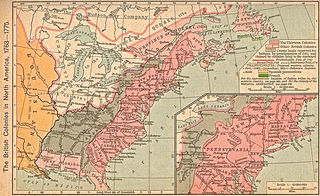
1774 (MDCCLXXIV) was a common year starting on Saturday of the Gregorian calendar and a common year starting on Wednesday of the Julian calendar, the 1774th year of the Common Era (CE) and Anno Domini (AD) designations, the 774th year of the 2nd millennium, the 74th year of the 18th century, and the 5th year of the 1770s decade. As of the start of 1774, the Gregorian calendar was 11 days ahead of the Julian calendar, which remained in localized use until 1923.
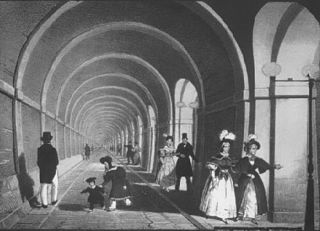
1843 (MDCCCXLIII) was a common year starting on Sunday of the Gregorian calendar and a common year starting on Friday of the Julian calendar, the 1843rd year of the Common Era (CE) and Anno Domini (AD) designations, the 843rd year of the 2nd millennium, the 43rd year of the 19th century, and the 4th year of the 1840s decade. As of the start of 1843, the Gregorian calendar was 12 days ahead of the Julian calendar, which remained in localized use until 1923.

1847 (MDCCCXLVII) was a common year starting on Friday of the Gregorian calendar and a common year starting on Wednesday of the Julian calendar, the 1847th year of the Common Era (CE) and Anno Domini (AD) designations, the 847th year of the 2nd millennium, the 47th year of the 19th century, and the 8th year of the 1840s decade. As of the start of 1847, the Gregorian calendar was 12 days ahead of the Julian calendar, which remained in localized use until 1923.

1850 (MDCCCL) was a common year starting on Tuesday of the Gregorian calendar and a common year starting on Sunday of the Julian calendar, the 1850th year of the Common Era (CE) and Anno Domini (AD) designations, the 850th year of the 2nd millennium, the 50th year of the 19th century, and the 1st year of the 1850s decade. As of the start of 1850, the Gregorian calendar was 12 days ahead of the Julian calendar, which remained in localized use until 1923.
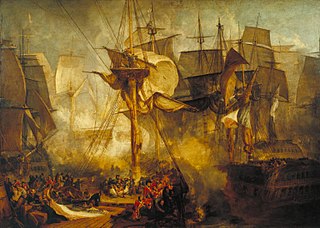
1805 (MDCCCV) was a common year starting on Tuesday of the Gregorian calendar and a common year starting on Sunday of the Julian calendar, the 1805th year of the Common Era (CE) and Anno Domini (AD) designations, the 805th year of the 2nd millennium, the 5th year of the 19th century, and the 6th year of the 1800s decade. As of the start of 1805, the Gregorian calendar was 12 days ahead of the Julian calendar, which remained in localized use until 1923.

1856 (MDCCCLVI) was a leap year starting on Tuesday of the Gregorian calendar and a leap year starting on Sunday of the Julian calendar, the 1856th year of the Common Era (CE) and Anno Domini (AD) designations, the 856th year of the 2nd millennium, the 56th year of the 19th century, and the 7th year of the 1850s decade. As of the start of 1856, the Gregorian calendar was 12 days ahead of the Julian calendar, which remained in localized use until 1923.

1798 (MDCCXCVIII) was a common year starting on Monday of the Gregorian calendar and a common year starting on Friday of the Julian calendar, the 1798th year of the Common Era (CE) and Anno Domini (AD) designations, the 798th year of the 2nd millennium, the 98th year of the 18th century, and the 9th year of the 1790s decade. As of the start of 1798, the Gregorian calendar was 11 days ahead of the Julian calendar, which remained in localized use until 1923.

1778 (MDCCLXXVIII) was a common year starting on Thursday of the Gregorian calendar and a common year starting on Monday of the Julian calendar, the 1778th year of the Common Era (CE) and Anno Domini (AD) designations, the 778th year of the 2nd millennium, the 78th year of the 18th century, and the 9th year of the 1770s decade. As of the start of 1778, the Gregorian calendar was 11 days ahead of the Julian calendar, which remained in localized use until 1923.
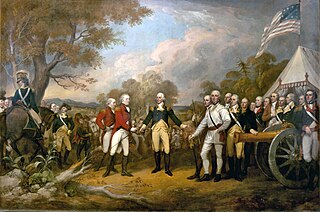
1777 (MDCCLXXVII) was a common year starting on Wednesday of the Gregorian calendar and a common year starting on Sunday of the Julian calendar, the 1777th year of the Common Era (CE) and Anno Domini (AD) designations, the 777th year of the 2nd millennium, the 77th year of the 18th century, and the 8th year of the 1770s decade. As of the start of 1777, the Gregorian calendar was 11 days ahead of the Julian calendar, which remained in localized use until 1923.

1775 (MDCCLXXV) was a common year starting on Sunday of the Gregorian calendar and a common year starting on Thursday of the Julian calendar, the 1775th year of the Common Era (CE) and Anno Domini (AD) designations, the 775th year of the 2nd millennium, the 75th year of the 18th century, and the 6th year of the 1770s decade. As of the start of 1775, the Gregorian calendar was 11 days ahead of the Julian calendar, which remained in localized use until 1923.

1776 (MDCCLXXVI) was a leap year starting on Monday of the Gregorian calendar and a leap year starting on Friday of the Julian calendar, the 1776th year of the Common Era (CE) and Anno Domini (AD) designations, the 776th year of the 2nd millennium, the 76th year of the 18th century, and the 7th year of the 1770s decade. As of the start of 1776, the Gregorian calendar was 11 days ahead of the Julian calendar, which remained in localized use until 1923.





























